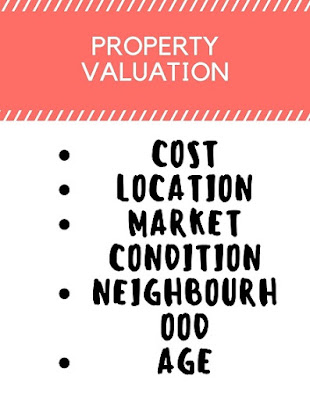VALUATION OF LAND AND BUILDING: THE THINGS YOU SHOULD KNOW
WHAT IS VALUATION?
Valuation is the determination of the amount for which a property will transact on a particular date. Accurate real estate valuation is important to mortgage lenders, investors, insurers, buyers, and sellers of real property. Estimating the value of the real estate is necessary for a variety of endeavours, lenders need a valuation to make financing decisions, realtors need it for sales listing, investors need it for investment analysis, and insurers need it for property insurance, and government departments need it for taxation. But for most people, determining the asking or purchase price of a piece of real property is the most useful application of real estate valuation.
This article will provide an introduction to the basic concepts and methods of real estate valuation, particularly as it pertains to sales.
Methods of Valuation
An estimate of a property's value must take into consideration economic and social trends, as well as governmental controls or regulations and environmental conditions that may influence the four elements of value:
• Demand: the desire or need for ownership supported by the financial means to satisfy the desire
• Utility: the ability to satisfy future owners' desires and needs
• Scarcity: the finite supply of competing properties
• Transferability: the ease with which ownership rights are transferred Market Value An appraisal is an opinion or estimate regarding the value of a particular property as of a specific date.
Appraisal reports are used by businesses, government agencies, individuals, investors, and mortgage companies when making decisions regarding real estate transactions. The goal of an appraisal is to determine a property's market value – the most probable price that the property will bring in a competitive and open market. Market price, the price at which a property actually sells, may not always represent the market value. For example, if a seller is under duress because of the threat of foreclosure, or if a private sale is held, the property may sell below its market value. Appraisal Methods An accurate appraisal depends on the methodical collection of data. Specific data, covering details regarding the particular property, and general data, pertaining to the nation, region, city, and neighbourhood wherein the property is located, are collected and analyzed to arrive at a value.
Appraisals use three basic approaches to determine a property's value.
Method 1:
Sales Comparison Approach The sales comparison approach is commonly used in valuing single-family homes and land. Sometimes called the market data approach, it is an estimate of value derived by comparing a property with recently sold properties with similar characteristics. These similar properties are referred to as comparableS, and in order to provide a valid comparison, each must: • Be as similar to the subject property as possible • Have been sold within the last year in an open, competitive market • Have been sold under typical market conditions At least three or four comparables should be used in the appraisal process. The most important factors to consider when selecting comparables are the size, comparable features, and – perhaps most of all – location, which can have a tremendous effect on a property's market value. Comparables' Qualities Since no two properties are exactly alike, adjustments to the comparables' sales prices will be made to account for dissimilar features and other factors that would affect value, including • Age and condition of buildings • Date of sale, if economic changes occur between the date of sale of a comparable and the date of the appraisal • Terms and conditions of sale, such as if a property's seller was under duress or if a property was sold between relatives (at a discounted price) • Location since similar properties might differ in price from neighbourhood to neighbourhood • Physical features, including lot size, landscaping, type and quality of construction, number and type of rooms, square feet of living space, hardwood floors, a garage, kitchen upgrades, a fireplace, a pool, central air, etc. The market value estimate of the subject property will fall within the range formed by the adjusted sales prices of the comparables. Since some of the adjustments made to the sales prices of the comparables will be more subjective than others, weighted consideration is typically given to those comparables that have the least amount of adjustment.
Method 2:
Cost Approach The cost approach can be used to estimate the value of properties that have been improved by one or more buildings. This method involves separate estimates of value for the building(s) and the land, taking into consideration depreciation. The estimates are added together to calculate the value of the entire improved property. The cost approach makes the assumption that a reasonable buyer would not pay more for an existing improved property than the price to buy a comparable lot and construct a comparable building. This approach is useful when the property being appraised is a type that is not frequently sold and does not generate income. Examples include schools, churches, hospitals, and government buildings. Building costs can be estimated in several ways, including the square-foot method where the cost per square foot of a recently built comparable is multiplied by the number of square feet in the subject building; the unit-in-place method, where costs are estimated based on the construction cost per unit of measure of the individual building components, including labour and materials; and the quantity-survey method, which estimates the quantities of raw materials that will be needed to replace the subject building, along with the current price of the materials and associated installation costs. Depreciation For appraisal purposes, depreciation refers to any condition that negatively affects the value of an improvement to real property, and takes into consideration: • Physical deterioration, including curable deterioration, such as painting and roof replacement, and incurable deterioration, such as structural problems • Functional obsolescence, which refers to physical or design features that are no longer considered desirable by property owners, such as outdated appliances, dated-looking fixtures or homes with four bedrooms, but only one bath • Economic obsolescence, caused by factors that are external to the property, such as being located close to a noisy airport or polluting factory. Methodology • Estimate the value of the land as if it were vacant and available to be put to its highest and best use, using the sales comparison approach since land cannot be depreciated. • Estimate the current cost of constructing the building(s) and site improvements. • Estimate the amount of depreciation of the improvements resulting from deterioration, functional obsolescence, or economic obsolescence. • Deduct the depreciation from the estimated construction costs. • Add the estimated value of the land to the depreciated cost of the building(s) and site improvements to determine the total property value.
Method 3:
Income Capitalization Approach Often called simply the income approach, this method is based on the relationship between the rate of return an investor requires and the net income that a property produces. It is used to estimate the value of income-producing properties such as apartment complexes, office buildings, and shopping centres. Appraisals using the income capitalization approach can be fairly straightforward when the subject property can be expected to generate future income, and when its expenses are predictable and steady. Direct Capitalization Appraisers will perform the following steps when using the direct capitalization approach: • Estimate the annual potential gross income. • Take into consideration vacancy and rent collection losses to determine the effective gross income. • Deduct annual operating expenses to calculate the annual net operating income. • Estimate the price that a typical investor would pay for the income produced by the particular type and class of property. This is accomplished by estimating the rate of return, or capitalization rate. • Apply the capitalization rate to the property's annual net operating income to form an estimate of the property's value. Gross Income Multipliers The gross income multiplier (GIM) method can be used to appraise other properties that are typically not purchased as income properties but that could be rented, such as one- and two-family homes. The GRM method relates the sales price of a property to its expected rental income. For residential properties, the gross monthly income is typically used; for commercial and industrial properties, the gross annual income would be used. The gross income multiplier method can be calculated as follows: Sales Price ÷ Rental Income = Gross Income Multiplier Recent sales and rental data from at least three similar properties can be used to establish an accurate GIM. The GIM can then be applied to the estimated fair market rental of the subject property to determine its market value, which can be calculated as follows: Rental Income x GIM = Estimated Market Value The Bottom Line Valuing real estate is difficult since each property has unique features such as location, lot size, floor plan, and amenities. General real estate market concepts like supply and demand in a given region will certainly play into a particular property's overall value. Individual properties, however, must be subject to appraisal, using one of several methods, to ascertain a fair value. Accurate real estate valuation is important to mortgage lenders, investors, insurers and buyers, and sellers of real property. While appraisals are generally performed by skilled professionals, anyone involved in a real transaction can benefit from gaining a basic understanding of the different methods of real estate valuation.
PS Our Valuation Services: • Loan security • Insurance valuations • Valuations for secured lending • Financing • Statutory tax valuations • valuation of property like aluminium works, steelworks, breweries, refineries, chemical works, airport terminals, etc. • Valuation of plant and machinery
Post Script
Contact us for bungalow, Land for sale, penthouse, home for sale, lagos cheap houses, houses for sale in nigeria, bed room house for sale in lagos, duplex, terrace, real estate broker,Container home,Luxury homes, Smart homes, Property valuations, real estate business plan, poperty development, home for sale, real estate business plan, online real estate agency, land agent, real estate legal services, title company, estate liquidator, estate planning lawyer, estate planning, setting up estate company, serviced apartment, apartment sales and lettings, apartment building, bedroom flat, Selfcontain, single room for rent, real estate investment options, real estate investment trust, realestate investment group, real estate investment firms, real estate investment loans, real estate investment clubs, real estate attorney, realtor, real estate marketing materials/tools/ideas/plans, real estate marketing flyers, PWAN marketing flyers, rent to own realtors, real estate leads for realtors, realtor course, Land banking, property lawyer, property auctions, property management software, house plans, house insurance, and students' accommodation.
OUR ESTATE LOCATION:
Abuja, Asaba, Enugu, Uyo, Calabar, Port Harcourt, Ibadan, Benin, Warri, Osogbo, Ota, Awka, Owerri, Umuahia, Abakaliki, Epe, lagos, Abeokuta, Ogun and nationwide
SMS, Call or WhatsApp: 07030765952
bikejoseph@gmail.com
https://joenigeria.blogspot.com
For DailyProperty listing In Uyo
For our products and services
For updated landlistings nationwide
For more information about Joe Nigeria











Comments
Post a Comment